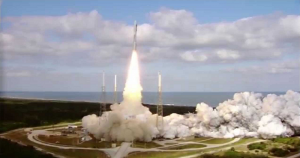
NASA’s New Horizons Spacecraft Marks 10 Years Since Launch
Ten years ago, on 19th January, one of the great robotic explorers of our age – NASA’s New Horizons spacecraft rocketed into the sky above the Florida coastline, marking a historic moment in space exploration. The small probe weighing barely 1,000 pounds, sped from Earth faster than any spacecraft before it, embarking on a 9.5-year voyage across more than 3 billion miles that culminated last summer in the historic first reconnaissance of Pluto and its family of small moons.
Watch the Video Of New Horizons Launch Here:
ABOVE VIDEO: Two views of launch of NASA’s New Horizons spacecraft aboard an Atlas V rocket on January 19, 2006, from Cape Canaveral Air Force Station, Fla.
Pluto is the farthest destination for any space mission in history. Until very recently, the best photos ever taken, showed it (Pluto) as a small dot. Today, New Horizons, now far beyond Pluto, continues to send back data from that July 14 flyby.
It took New Horizons nine years to cover the 3 billion mile trip there — which means it’s currently using decade-old technology, traveling a route that was calculated years ago. And because New Horizons was traveling at such a high speed (about 31,000 miles per hour) and couldn’t slow down, the flyby was over in a matter of minutes.
As New Horizons began delivering the data and close-ups of Pluto and Charon – opening the door to a new realm of the solar system – the sense of anticipation that began at launch has given way to a sense of pride and accomplishment.